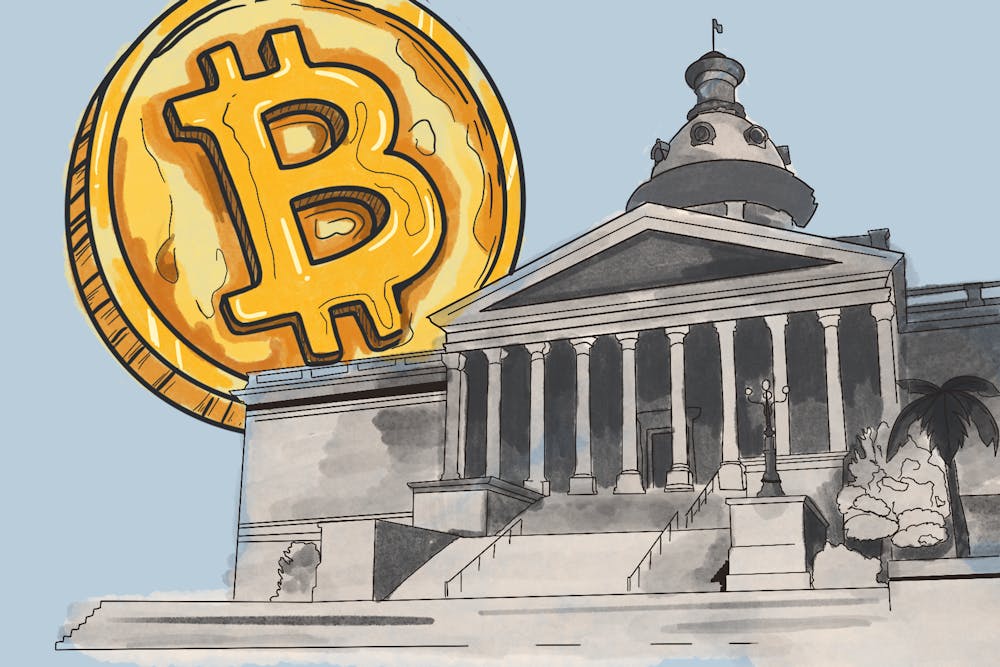A South Carolina bill recently presented aiming to regulate cryptocurrency in the central bank has provoked discussion among South Carolinas users and legislators about how the currency will impact the state.
Discussions of the bill have been intended to set guidelines around how cryptocurrency is treated in terms of payments, taxes and regulations.
“Our goal in passing this legislation is to create a legislative framework that describes digital assets, the technology that underwrites them and what you are allowed to do with them in the state of South Carolina,” Eric Peterson, the policy director of Satoshi Action Fund said.

”The bill creates a basic framework for regulating cryptocurrency transactions and mining,” said Steven Gilbert, the research director for the subcommittee.
The meeting consisted of discussion of the guidelines for expanding cryptocurrency operations within the state while also addressing concerns related to its use, particularly in mining and transactions.
The bill is designed to tackle a series of issues that are currently present with cryptocurrency. It is split into several major sections to address the key concerns the creators have.
There was extensive discussion on the third section of the bill that addresses zoning concerns, particularly related to mining businesses. It ensures that local municipalities cannot impose restrictions targeting mining operations in industrial zones.
Bitcoin mining uses high-performance computers to validate transactions and generate new bitcoins. However, it uses great amounts of energy and expensive hardware, which can impact its profitability.
This bill will affect many South Carolinians, according to Peterson, as around 800,000 people in the state own some kind of digital asset. The most popular form of the currency is Bitcoin, Patrick Hidalgo, a South Carolina based Bitcoin miner, said.
Some of the issues of mining discussed in the hearing include the loud noise and their heavy use of water and electricity. This means the mine sites have to be located in rural towns.
This issue became a topic of discussion when Senator Mike Reichenbach asked if Peterson had heard from the counties these sites could be built in.
Peterson is in favor of mining in small, rural towns. He said that the sites would actually help bring jobs to people in small towns. These positions offer high-paying jobs that require just a couple of weeks of prior training and a high school diploma.
"The other real big benefit to these rural communities is often they're suffering from population loss because they're buying so much electricity," Peterson said "And paying a tax on that, they can put significant money into the budget in some of these areas.”
George Crouch, leader of the Midlands Crypto Club explained that the bill is looking to resolve the issues with mining. It is also looking to have the same laws apply to every county, he said.
He also explained how it will be beneficial for South Carolina citizens.
“The way I understood it, they're looking to create some guardrails to protect the South Carolina citizens in digital transactions,” Crouch said.
Ashley Gunn, from Coinbase, spoke at the meeting about the importance of South Carolina’s role in the broader cryptocurrency economy. She explained that blockchain technology, which underpins cryptocurrencies, offers unmatched security, transparency and access to financial services for a new generation.
“The benefits of crypto include lower transaction fees, inflation hedge, more transparency and great price,” Gunn said.
Bitcoin is incredibly reliable in the sense that it has always been up and running, Hidalgo said.
“Imagine if 80% of AWS [Amazon Web Services] went down in one day. What would happen? Chaos, right? So that happened, Bitcoin didn't miss a beat. Didn't miss a beat,” Hidalgo said.
Crypto has benefits for consumers like helping to lower transaction fees. However, the government sees potential issues if left unchecked, Daniel Ostergaard, full clinical faculty of international business at the Darla Moore School of Business said.
“So part of the interest from government, of course, is that crypto, left to its own, means that there's less taxes coming in, and so there's an incentive for government there to do some type of regulation on the type of crypto that's used for exchange,” Ostergaard said.
Cryptocurrency is evolving rapidly, and as government officials better understand its impact, more regulations and restrictions are also being proposed to address potential issues before they become severe, leading to growing awareness of crypto, Ostergaard said.
While the proposed regulations in the bill are important, Ostergaard said that there are still a lot of other issues that need to be solved by regulations on cryptocurrency.
“Transactions are pseudo synonymous, (which) means that criminals can use it and have some degree of anonymity. And I don't think we want to have any system that makes it easier for criminals to do what they do,” Ostergaard said.
He said that there is a lot of uncertainty that comes with cryptocurrency and that young people specifically need to be cautious when they look into buying crypto as it is still unregulated at this point in time.
“Just be very cautious, if you're thinking that crypto is going to be an investment, that it's not without risk. And I would even say in some cases, it's a high degree of risk,” Ostergaard said.

